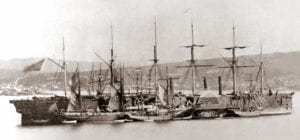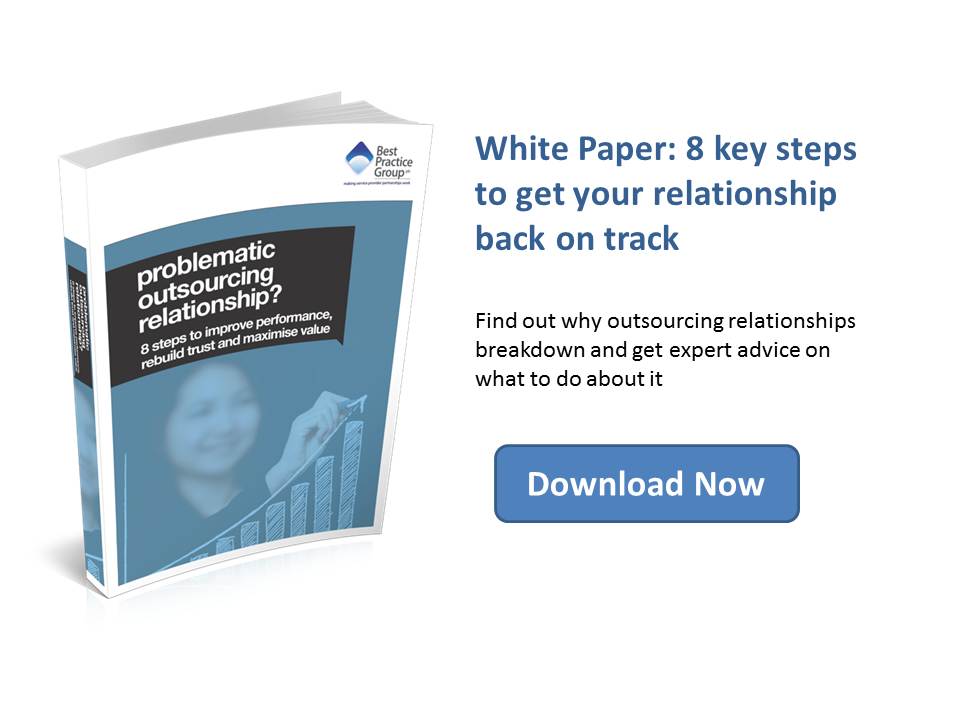 Supplier relationships can be complicated, they can be messy and they can at times be self- destructive. Poor planning, insufficient research, ambiguous contracts and conflicting agendas – all can contribute. These errors or omissions don’t even need to be substantial in order to put a strain on a relationship. Sometimes, the most innocuous of differences can have wide-reaching and long-lasting effects on outsourced partnerships.
Supplier relationships can be complicated, they can be messy and they can at times be self- destructive. Poor planning, insufficient research, ambiguous contracts and conflicting agendas – all can contribute. These errors or omissions don’t even need to be substantial in order to put a strain on a relationship. Sometimes, the most innocuous of differences can have wide-reaching and long-lasting effects on outsourced partnerships.
It is this complicated arena, governed by human nature, personality and preparedness, that has caught out even the most intellectual and market savvy in the past. As an example, we have chosen a pillar of British innovation who, even after a lifetime of experience working with outsourced suppliers found his biggest and most ambitious project foundering as he too fell victim to a crumbling supplier relationship. We can learn much from this famous case study. And using our years of experience in large-contract relationship management,we can now place a modern perspective on the whole messy and expensive affair.
Isambard Kingdom Brunel is widely recognised as one of the most influential engineers of the 19th century. His portfolio includes dockyards, tunnels, viaducts, bridges, railway lines and ocean-going vessels, including the biggest, most advanced and luxurious steamships of the age. It is the last of these immense projects that we are using as our case study here, the building of the SS Great Eastern, by far the largest ship ever built at the time of its launch – five times bigger than any of her predecessors. The story of her construction is rife with intrigue and betrayal, broken trust and poor decision-making. Not only is it perfect for a supplier relationship ‘lessons learned’ piece, but it has all the trappings of a Hollywood movie.
Author Dr Mark Seneschall has kindly supplied us with extracts from his book on the complexities of negotiating large projects and we have adapted them for this article.
The SS Great Eastern did eventually launch, but Brunel was no longer alive to witness it. His greatest work had cost him dearly. We respectfully use this example to show how you may be able to reach the finish line on your supplier relationship projects at less personal cost.
1. Look behind the smiles and pleasantries
Having met John Scott Russell at The Great Exhibition of 1851 and having worked on two steamships with him between 1851 and 1852 – the Victoria and the Adelaide – Brunel already held Russell in high regard, as did the rest of the shipbuilding community, when he asked Russell to build the SS Great Eastern for him. However, unworkably low bids, financial instability, accusations of financial impropriety, arguments, disagreements, distrust and ultimately legal action strongly suggest that all was not quite as it seemed on the surface.
The communication between these two men and their eventual relationship breakdown provide us with an important lesson in supplier selection. No matter how pleasant an outsourced supplier may seem, no matter how well you know them, or how highly regarded you believe them to be, it is essential that all necessary steps are taken to establish whether a potential supplier is the best choice for a project. This, of course, includes whether they have all the resources necessary to deliver the outcomes you expect.
2. The vital importance of complete and accurate pre-contract due diligence
Related to the above lesson but going some way further is the importance of due diligence. It is common for suppliers to offer one-off, limited-time offers in order to coax you into a more rapid instruction, but never skimp on the important risk-limiting stages of your project development. Complete and accurate due diligence is essential in order to determine the suitability of any potential supplier. It is the only way you will uncover potential weaknesses that could widen to become real supplier relationship problems in the future. Unearthing such issues may not change your mind over a supplier selection but will at least alert you to the possibility of their escalating.
Back to our case study. Had Brunel looked a little deeper, he would have realised a number of important things. First, Russell’s shipyard was not big enough to build the SS Great Eastern. Then there was the issue of pilfering and poor supervision, and the river was not deep enough or wide enough to launch the ship as Brunel wanted. Finally, Russell’s finances would lead him to declare bankruptcy in 1856 – not helped by three fires in three years that severely damaged his uninsured shipyards. All of these led to delays, cost overruns and, ultimately, an already strained relationship was all but broken.
3. Why the lowest bid is often a poisoned chalice
In a seemingly desperate attempt to win the contract, for what he knew would be a monumental and historic project, Russell submitted an unworkably low bid. Brunel accepted this bid despite having himself estimated the costs to be at least 50% higher. While Brunel held Russell in high regard and may have relied on his expertise in the matter, he should have made more of an issue of the budget – this might have saved the project much pain.
It is the responsibility of a supplier to budget correctly for the products or services they will be providing. Legally you have a case if they do not, because you have relied on their professional expertise. But outsourced service management requires you to think about the ramifications of allowing a supplier to undervalue a project despite your knowing that their figure is too good to be true. Although it may be a short-term win for your procurement department, the potential future supplier behavioural ramifications of allowing an underpriced bid through need to be considered. Many strained relationships that we have been called in to assist with have gone astray because one side felt that the other should be giving more – and often this is to do with money.
4. What is ICF and why you need it
Intelligent client function (ICF) is one of the least utilised yet most important features of a successful project or supplier relationship. Your job does not stop when you hand over to your outsourced service provider. Their job is to professionally manage their responsibilities, but your job is to remain aware not only of what these are but how well they are achieving them. Your ICF team are your early-warning system against the trials and tribulations that any project can fall victim to. Without an adequately funded and resourced ICF team, you are totally in the dark. This is a dangerous place to be, no matter how much you may trust your supplier at the outset.
Russell may have been the foremost naval architect of the day, but on the SS Great Eastern he took some very odd turns. He decided to build the ship on the river bank rather than in dry dock as had been planned. While working on the SS Great Eastern, he built six other ships, no doubt affecting the timeline of Brunel’s project. Noticing a discrepancy in the amount of iron bought and the amount used in the construction of the ship, Brunel started to question Russell’s integrity. Then, when the ship actually launched, insufficient safety controls resulted in an explosion in the paddle engines, killing five people. Had Brunel maintained more visibility throughout the project, some of these outcomes could have been avoided, or their ramifications minimised at least.
5. Resist the temptation to interfere
Some legal protection is afforded to you if things go awry on a project where you had relied on the expertise of your supplier and their assertions that they would be able to achieve your expectations and agreed outcomes. But if you interfere, you do run the risk of undermining this. While you will undoubtedly know your business best, your role is to explain the ‘what’ side of the outcomes you are expecting from a project and leave the ‘how’ to your outsourced supplier. If you start to involve yourself in the way in which they deliver their services, this leaves the door open for suppliers to claim that it was because of your interference that the project failed in some capacity.
The SS Great Eastern suffered from much transitional management. Initially Russell was in charge, but when he announced bankruptcy Brunel took over supervision. Despite Brunel being in charge, it was Russell who won out on the matter of the launch method. Then Russell took over again when he won the contract to fit out the ship. With so much chopping and changing, either party could claim the other had impacted on the likelihood of the project’s success.
6. Payment structures can determine attitudes.
The way Brunel decided to pay Russell was not at all helpful for Russell’s financial situation. First, Brunel part-paid Russell with shares in the company that was set up to build the ship, causing many of Russell’s liquidity problems that probably necessitated the taking on of other work, delaying the SS Great Eastern, though this did not prevent Russell’s eventual bankruptcy. His situation could not have been helped by the three fires on his uninsured shipyard and the theft of materials which was rife. Russell wanted a lump sum payment up front, whereas Brunel wanted to pay Russell on a monthly basis governed by the work’s progress.
Payment structure can be used to motivate your outsourced supplier to achieve your outcome expectations. But poorly considered payment structures can encourage lethargy and poor behaviours that can also lead to relationship strains. Consider what is fair, consider what they need to achieve your goals and consider what will spur them on while maintaining a good working relationship.
7. The often insurmountable challenge of contract termination
Why did Brunel, whose relationship with Russell had deteriorated from friendship and respect to poor communication and legal action, decide to award Russell a second contract to fit out the SS Great Eastern? Despite the relationship between the two men being terribly strained, Brunel made the decision that terminating his relationship with Russell would just be too complicated. Russell understood the project so intimately, he was still the best person for the job.
No matter how much your relationship with your outsourced suppliers falters, it is always worth trying all that you can to bring it back on track before considering termination. Changing suppliers is possible, even in mid project, but it is essential that you are aware of the potential issues such a move can cause and be prepared for them. Brunel knew this and even though Russell made the cardinal mistake of once again underestimating in his bid to win the fit-out, he did complete the project and the SS Great Eastern was launched.
No matter how innovative her design, luxurious her fit-out, immense her size and incredible her engineering feat, the SS Great Eastern was not, in the end, a commercial success. But, through this failure she does provide us with an excellent example of client–supplier relationship-management issues. The lessons we can learn from Brunel’s experience with Russell on the construction of the SS Great Eastern are as relevant today as they were then.
We hope they inspire behaviours and strategies that ensure your project relationships drive more successful project outcomes.


